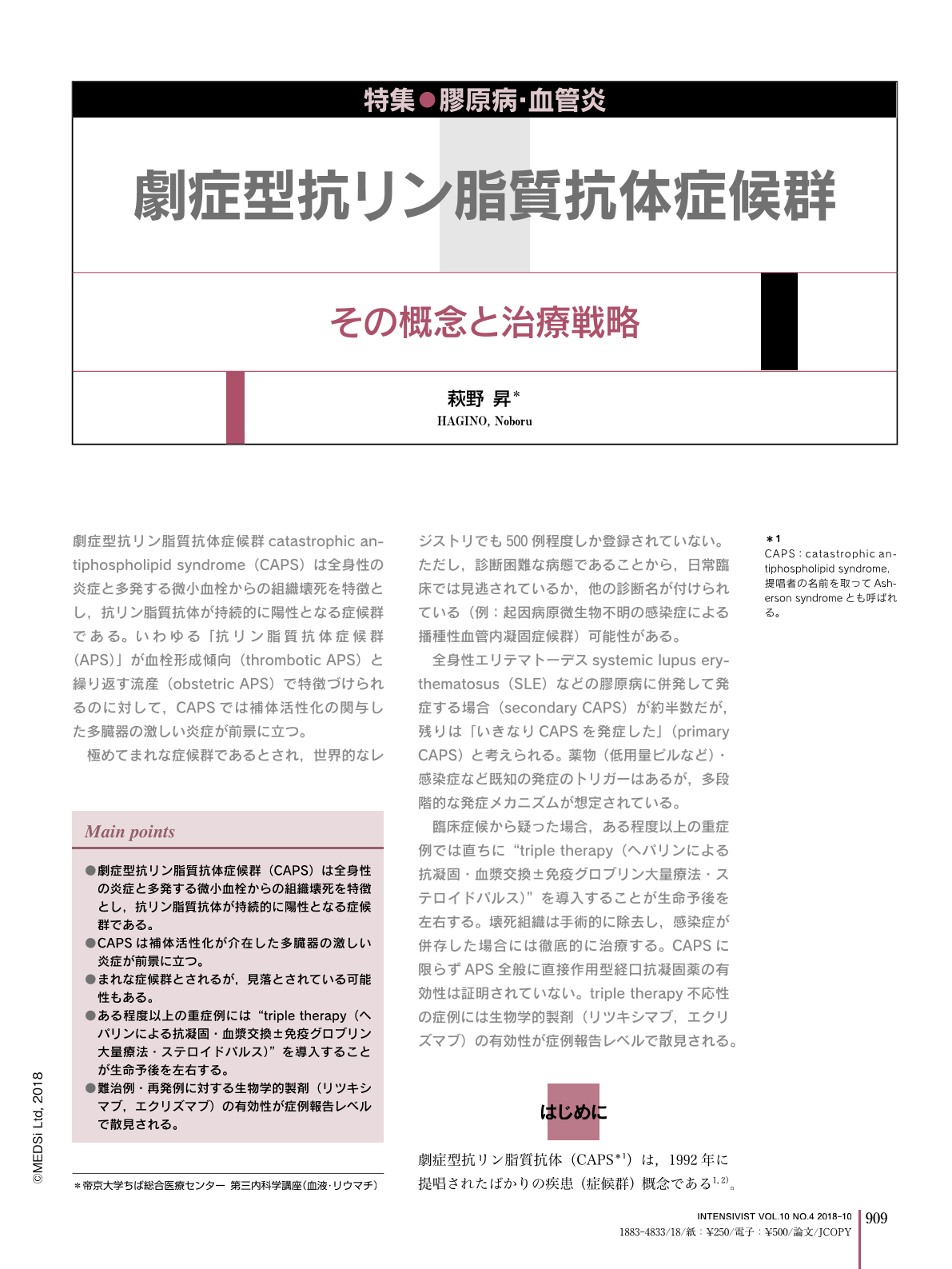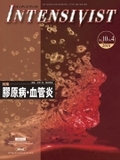Japanese
English
- 有料閲覧
- Abstract 文献概要
- 1ページ目 Look Inside
- 参考文献 Reference
劇症型抗リン脂質抗体症候群catastrophic antiphospholipid syndrome(CAPS)は全身性の炎症と多発する微小血栓からの組織壊死を特徴とし,抗リン脂質抗体が持続的に陽性となる症候群である。いわゆる「抗リン脂質抗体症候群(APS)」が血栓形成傾向(thrombotic APS)と繰り返す流産(obstetric APS)で特徴づけられるのに対して,CAPSでは補体活性化の関与した多臓器の激しい炎症が前景に立つ。
極めてまれな症候群であるとされ,世界的なレジストリでも500例程度しか登録されていない。ただし,診断困難な病態であることから,日常臨床では見逃されているか,他の診断名が付けられている(例:起因病原微生物不明の感染症による播種性血管内凝固症候群)可能性がある。
全身性エリテマトーデスsystemic lupus erythematosus(SLE)などの膠原病に併発して発症する場合(secondary CAPS)が約半数だが,残りは「いきなりCAPSを発症した」(primary CAPS)と考えられる。薬物(低用量ピルなど)・感染症など既知の発症のトリガーはあるが,多段階的な発症メカニズムが想定されている。
臨床症候から疑った場合,ある程度以上の重症例では直ちに“triple therapy(ヘパリンによる抗凝固・血漿交換±免疫グロブリン大量療法・ステロイドパルス)”を導入することが生命予後を左右する。壊死組織は手術的に除去し,感染症が併存した場合には徹底的に治療する。CAPSに限らずAPS全般に直接作用型経口抗凝固薬の有効性は証明されていない。triple therapy不応性の症例には生物学的製剤(リツキシマブ,エクリズマブ)の有効性が症例報告レベルで散見される。
Main points
●劇症型抗リン脂質抗体症候群(CAPS)は全身性の炎症と多発する微小血栓からの組織壊死を特徴とし,抗リン脂質抗体が持続的に陽性となる症候群である。
●CAPSは補体活性化が介在した多臓器の激しい炎症が前景に立つ。
●まれな症候群とされるが,見落とされている可能性もある。
●ある程度以上の重症例には“triple therapy(ヘパリンによる抗凝固・血漿交換±免疫グロブリン大量療法・ステロイドパルス)”を導入することが生命予後を左右する。
●難治例・再発例に対する生物学的製剤(リツキシマブ,エクリズマブ)の有効性が症例報告レベルで散見される。
Catastrophic antiphospholipid syndrome (CAPS) is characterized by excessive, complement-mediated, systemic inflammation and microvascular thrombosis which eventually leads to tissue necrosis and multiple organ failure, with the continuous presence of antiphospholipid antibody. The incidence of CAPS is low, and an international registry has registered only 500 cases worldwide. Primary CAPS without a diagnosis of previously known rheumatic disease comprises about half of the registered cases. Some authorities suggest that CAPS may be underdiagnosed, since establishing the diagnosis of primary CAPS is extremely difficult. One must have a low threshold to diagnose CAPS in patients with systemic inflammation, microvascular thrombosis, and multiple organ failure. “Triple therapy” including heparin, pulse steroids, and plasma exchange, must be initiated for patients with “suspected CAPS”. Other possible interventions include intravenous immunoglobulin, amputation of necrotic tissue, and drastic treatment of the underlying infection. Biologic agents such as Rituximab and Eculizumab have been reported to be effective in refractory or relapsing cases.

Copyright © 2018, MEDICAL SCIENCES INTERNATIONAL, LTD. All rights reserved.


